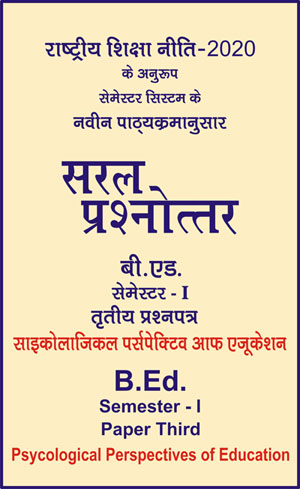|
बी एड - एम एड >> बी.एड. सेमेस्टर-1 प्रश्नपत्र-III - साइकोलाजिकल पर्सपेक्टिव आफ एजूकेशन बी.एड. सेमेस्टर-1 प्रश्नपत्र-III - साइकोलाजिकल पर्सपेक्टिव आफ एजूकेशनसरल प्रश्नोत्तर समूह
|
|
|||||||
बी.एड. सेमेस्टर-1 प्रश्नपत्र-III - साइकोलाजिकल पर्सपेक्टिव आफ एजूकेशन (अंग्रेजी भाषा में)
OBJECTIVE TYPE QUESTIONS
For each of the following questions, four alternatives are given for the answer. Only one of them is correct. Choose the correct alternative.
-
.......... is the complex of mental characteristics that makes each of us unique from other people.
(a) Heredity
(b) Emotional tone
(c) Personality
(d) None of these -
Our personalities developed as a result of .......... .
(a) Genetic inheritance
(b) Environmental influences
(c) Both of the above
(d) None of these -
Which of the following things can have an effect on the development of an individual's personality?
(a) Physical and mental capabilities
(b) Health and physical appearance
(c) Skin color, gender, and sexual orientation
(d) All of the above -
In China, children are usually taught to .......... .
(a) Think and act independently of other family members
(b) Be self-reliant rather than dependent on other family members
(c) Think and act as a member of their family and to suppress their own wishes when they are in conflict with the needs of the family
(d) (a) and (b) -
Outside of the Western World, .......... .
(a) Boys are socialized essentially the same as girls
(b) Girls are rarely encouraged to learn how to do domestic chores
(c) Children who do not follow traditional gender patterns in play and other activities are rarely labeled as marginal or deviant
(d) None of the above -
Which of the following statements is true ?
(a) Ruth Benedict argued that national personality types do not exist.
(b) We often share personality traits with others, especially members of our own family and community.
(c) The term modal personality refers to the personality traits shared by all members of a society.
(d) (b) and (c) both -
Largely as a result of fieldwork in the South Pacific, Margaret Mead came to the conclusion that .......... .
(a) Masculine and feminine personality traits are genetically inherited
(b) Culture, rather than genetic inheritance, makes women nurturing towards children and passive in response to men
(c) Samoan culture is puritanical in that it rigidly segregates boys and girls as they are growing up and forbids them to talk about sex.
(d) Both (b) and (c) -
The most common personality type within a society is .......... .
(a) A tradition-oriented personality
(b) An inner-directed personality type
(c) The modal personality
(d) None of these -
David Riesman proposed that there are three common types of modal personality. Which of the following is one of them?
(a) A Christian personality
(b) An indigenous personality
(c) A cosmopolitan personality
(d) None of the above -
An individual's actions are most likely to be strongly controlled by conscience if they have a(n) .......... type of personality?
(a) Inner-directed personality
(b) Other-directed personality
(c) Neither of the above
(d) None of these -
Advocates of David Riesman's concept of modal personalities suggest that the tradition-oriented personality is most common in .......... societies.
(a) Small-scale
(b) Culturally diverse large-scale
(c) All types of societies
(d) No types of societies - Which of the following statements is true concerning personality?
(a) People have either a tradition-oriented, inner-directed, or other-directed personality--no one has a combination of traits of these different modal personalities.
(b) Other-directed personalities are likely to be common in culturally diverse large-scale societies.
(c) Neither of the above statements is true
(d) None of these
|
|||||

 i
i 










